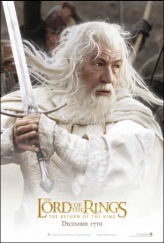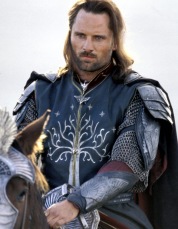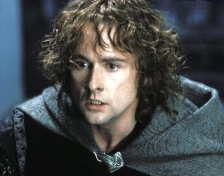The Lord of the
Rings:
The Return of the King |
| |
 |
New Zealand/USA, 2003. Rated PG-13. 201
minutes.
Cast:
Elijah Wood, Ian McKellen, Viggo Mortensen, Sean Astin, Orlando Bloom, John Rhys-Davies, Billy Boyd, Dominic Monaghan, Bernard Hill, Miranda Otto, David Wenham, Karl Urban, John Noble, Andy Serkis, Hugo Weaving, Liv Tyler, Cate Blanchett, Ian Holm
Writers: Fran Walsh, Philippa Boyens, Peter Jackson, based on the novel by J.R.R. Tolkien
Music: Howard Shore
Cinematographer: Andrew Lesnie
Producers: Peter Jackson, Barrie M. Osborne, Fran Walsh
Director: Peter Jackson
LINKS
|
 he Return of the King does not pick up where The Two Towers left off; it starts with the tragic history of Gollum (Andy Serkis), née Sméagol, a once peaceful fisherman (hobbit?) turned murderer for the lust of the Ring. He is steadily corrupted to the point of becoming the scheming villain of The Return of the King . As Sam and Frodo (Elijah Wood) trudge through what they think is the secret and safe path to Mordor, Gollum plots to lead the two hobbits to their death. Further east in Rohan, the rest of the Fellowship sits on the edge of war with the massive army of Sauron. Human Aragorn (Viggo Mortensen) urges King Théoden (Bernard Hill) of Rohan to act on the threat Sauron's army poses on the kingdom of Gondor. Meanwhile the wizard Gandalf, irritated by Pippin's (Billy Boyd) curiosity, whisks the young hobbit to the capital of Gondor, Minas Tirith, at the cost of separation from his friend Merry (Dominic Monaghan). There, in the White City, Gandalf quarrels with the crazed Steward of Gondor, Denethor (John Noble), the father of Faramir (David Wenham) and the slain Boromir (Sean Bean).
he Return of the King does not pick up where The Two Towers left off; it starts with the tragic history of Gollum (Andy Serkis), née Sméagol, a once peaceful fisherman (hobbit?) turned murderer for the lust of the Ring. He is steadily corrupted to the point of becoming the scheming villain of The Return of the King . As Sam and Frodo (Elijah Wood) trudge through what they think is the secret and safe path to Mordor, Gollum plots to lead the two hobbits to their death. Further east in Rohan, the rest of the Fellowship sits on the edge of war with the massive army of Sauron. Human Aragorn (Viggo Mortensen) urges King Théoden (Bernard Hill) of Rohan to act on the threat Sauron's army poses on the kingdom of Gondor. Meanwhile the wizard Gandalf, irritated by Pippin's (Billy Boyd) curiosity, whisks the young hobbit to the capital of Gondor, Minas Tirith, at the cost of separation from his friend Merry (Dominic Monaghan). There, in the White City, Gandalf quarrels with the crazed Steward of Gondor, Denethor (John Noble), the father of Faramir (David Wenham) and the slain Boromir (Sean Bean).
Peter Jackson's film trilogy has remained true to the spirit and quality of J.R.R. Tolkien's book by making an imaginary world real. What trips lesser fantasy stories are nonentities in Tolkien's Middle-Earth. So there are hobbits, dwarves, and elves alongside men—so what? Have they not always been there? Have they not always existed? The Lord of the Rings places no emphasis on the difference between the races of Middle-earth besides their height and cultural differences, and locations in Middle-earth are treated like regular places, so that we see the splendor of Minas Tirith and the malice of Minas Morgul through human eyes, not through the eyes of an author giddy over a new creation.

A king returns: Viggo Mortensen as Aragorn |
Tolkien's world is familiar as home. This authenticity and familiarity is evident in the film trilogy, and is most apparent with Gollum, a CGI creature so lifelike it is conceivable that the crew found the actual Gollum and filmed him live. He is the most dynamic, complex and genuine among his CGI kin. He schemes and plots with villainous glee, and pines for the Ring like a hopeless child. It feels wrong to credit Serkis' performance alone for the success of Gollum, since many were involved in creating Gollum, yet it is Serkis who brings out Gollum's complexities. Serkis inhabits Gollum's skin through every progression in his tragic life. He invokes sympathy for Gollum, for while it is obvious he is a threat, it is also obvious that he was made that way in part by an evil outside force.
The remaining cast does just as well. Praising them all would be a waste of time, as all carry their relative subplots with skill. Viggo Mortensen completes his three-film maturation from haggard ranger to noble king, and Ian McKellen is invisible in the role of Gandalf. But as McKellen and Mortensen have had two films to wow us (and have wowed us both times), a lesser known supporting player steps to the forefront in this third installment—Billy Boyd. If Pippin in any way stole the show in Tolkien's book, it is minimal compared to Boyd's film-stealing performance. Boyd wields the kind of charisma present in the best lead actors, elevating Pippin to the status he needs as one of the main catalysts of Return of the King. He is far more convincing than his co-stars as both a comedic and dramatic actor.
Elijah Wood is no less impressive as Frodo. Weary and determined, Wood's Frodo pushes himself towards Mount Doom with complete selflessness. However, the power of the Ring is deepening its hold on Frodo. Wood makes it apparent Frodo is thinking of himself, of “his” burden, “his” mission, and, near the end, of “his” ring—all this without saying a line of dialogue! The dialogue he does have complements the emotions and thoughts implicit in his physical performance. Alas for Wood's co-star that he is given clichéd dialogue; regardless, Sean Astin gives Sam a powerhouse performance that never goes out of relatable human range. He alone brings the audience closer to Frodo and into the emotional core of the Frodo-Sam plotline.

Billy Boyd, as Pippin, carries a bigger load in The Return of the King |
The one person who exists both inside and outside of Middle-Earth is Howard Shore—which is not to say his score is intrusive or uneven, but that his voice exists “outside” the fictional setting much like an author's voice. His score is the prose beckoning the reader into the story, moving their emotions in subtle ways by the diction and syntax. In short, his score is one of the most effectively manipulative ever written. Shore brings the audience to hope only to jar them with despair, to despair to raise them to hope, never at once hinting that a change in tone is near. He takes the audience's emotions captive and does not relent until the credits are over. Return of the King would be half the film it is without Shore's score. Similarly, the score does not stand alone; its power lost when separated from the film. Neither can succeed alone; each is perfectly married to the other.
Without the actors, the special effects, and the production design, the dialogue would single-handedly take the audience out of Middle-Earth. Gone is Tolkien's character-building poetry; here is dialogue straight out of a modern day action film. Gone, too, are the deep relationships of the books, replaced with thin banter. Fran Walsh, Philippa Boyens and Peter Jackson fail to recreate the surprises of Tolkien's book with their zeal for foreshadowing and “psychological drama.” With Frodo this is most unforgivable, as the foreseeable twist in Return on the King relies on the ambiguity of Frodo's attachment to the Ring. There is no ambiguity here, only the subtlety of a sledgehammer.
Still The Return of the King remains one of the better pictures ever made through Jackson 's remarkable directorial skill. He creates an intimate epic, directing his actors to dig deep into their characters to convey the minutest emotions, and relying on visuals and sound to draw the audience into the heart of the story. Yet because he is so dedicated in re-creating Middle-Earth as it was in the minds of the author and artists Alan Lee and John Howe, the film lacks the distinct mark of a unique director. The Return of the King may very well be Jackson 's masterpiece, but it may take another film for him to develop fully his own artistic vision.
Review
© January 2004 by AboutFilm.Com and the author.
Images © 2002 New Line Productions, Inc. All Rights Reserved.



